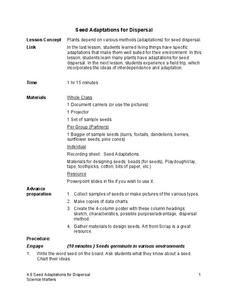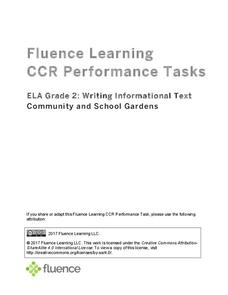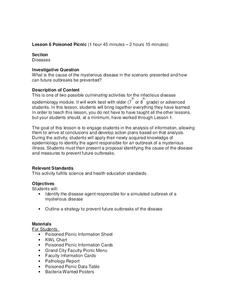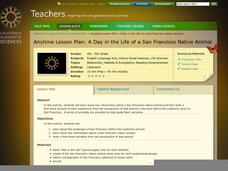Curated OER
Desert Plant Adaptations in the Sonoran Desert
Students are able to identify adaptations that plants have developed to deal with harsh desert conditions, as well as explain how these adaptations help to protect these plants.
K20 LEARN
Leaning Plants: Plant Adaptations, Growth, And Tropisms
Young scientists examine pictures of plants, then explore plant reactions found on the Missouri Botanical Gardens website. Scholars investigate why plants lean, then observe a plant of their own for six weeks to make new claims,...
Science Matters
Seed Adaptations for Dispersal
After a grand conversation about seeds, adaptation, and dispersal, scholars work collaboratively to examine seeds and record their findings on a four-column chart. Small groups share their observations and further discuss seed...
Curated OER
Hummingbirds and Flowers: A Study of Co-Adaptive Relationships
Hummingbirds and flowers need each other to survive! Pupils explore the co-adaptation of hummingbirds and the flowering plants. They explain how a flowering plant has adapted to be pollinated by a hummingbird and how the hummingbird has...
Chicago Botanic Garden
Migration, Adaptation, and Changing Climates
It is easy for humans to adapt to changing environments, but how do animals and plants do it? Classes discuss how plants and animals deal with environmental changes in the second of seven lessons. Through questions and discussions,...
Education Outside
Leaf Adaptations
Long life or a fast life cycle? Class members each gather a leaf, observe its characteristics such as texture, surface, scent, design, shading, and size and then discuss the adaptations made for survival as well as what the leaf reveals...
Curated OER
Plant Lifecycles
Students examine the life cycle of plants. In this plants lesson plan, students identify the various stages of plants and their parts. Students compare the life cycle of a plant with that of an animal. Activities suggested can be...
Curated OER
Creepers and Climbers
Students compare vines. In this vines lesson plan, students analyze the adaptations common in vines. Students determine if the vine grows using tendrils, modified roots, or twining stems. Students explore a forest area to flag different...
Curated OER
Invent a Plant
Young scholars investigate plant adaptations. In this plant adaptations instructional activity, students create a model of a plant. Young scholars are given action cards detailing specific environmental situations. Students design their...
University of Wisconsin
Bimodel Botany Bouquet
Gardeners are given an individual plant specimen from a bouquet of local rain garden plants. They group up by their plant type and then make observations together, name the plant, and introduce it to the rest of the class. You then share...
Virginia Department of Education
Animal Phyla and Plant Divisions
Searched hours for an activity that allows individuals the ability to use multiple resources to learn about both plant and animal kingdoms? This discussion and activity provide pupils with the ability to visualize each organism before...
Curated OER
Hedgerows
Hedgerows prevent soil erosion, capture pollutants running off fields, store carbon to help combat climate change, and provide homes for predators of many pest species. The biodiversity lesson begins with an activity that discusses why...
NOAA
Watch the Screen!
Can a sponge cure cancer? Life science pupils visit the drugstore under the sea in the fifth lesson of six. Working groups research the topic then get hands-on experience by testing the inhibiting effects of several plant extracts on E....
Curated OER
Design-A-Weed
Pupils create a "super weed" that prospers in teh harsh conditions on plant Weediv. They comprehend how weed adaptations give the plants an advantage over native plants. Students define the term adaptation. They give three examples of...
Curated OER
Eat Your Plants
Students explore fruits and vegetables. For this fruits and vegetables lesson, students work in small groups investigating plant parts. Students discover that fruits and vegetables originate from different parts of plants.
NASA
The Case of the Wacky Water Cycle
Join the tree house detectives in learning about the processes of the water cycle, water conservation, water treatment, and water as a limited resource.
Fluence Learning
Writing Informational Text: Community and School Gardens
Two informational texts feature community gardens of the past and present and how seeds grow. Scholars read, discuss what they have read, complete a timeline, define words, and compose a brief essay about the texts' main idea.
Chicago Botanic Garden
Meet the Naturalists
Studying plants is a full-time job—for some. After learning the ins and outs of phenology in the first three lessons in the unit, pupils explore the history of the science. The instructional activity highlights five historical...
Centers for Disease Control and Prevention
Poisoned Picnic
A group of teachers attended a picnic; ten became sick and another four died. Young scholars must solve the mystery of what happened. They research the river, waste water treatment plant, each food that was served, and environmental...
Desert Discoveries
What's For Dinner?
Youngsters compare the teeth of plant-eating dinosaurs with those of meat-eating dinosaurs. The concepts of herbivore vs. carnivore are also introduced. There is an excellent worksheet embedded in the plan which shows five skulls of...
Curated OER
Plankton in the Air
Here is a lab activity adequate for use with any full lesson on environmental factors that shape animal adaptations or marine animal characteristics. Pupils will discuss the role plankton plays in the environment and filter-feeding...
California Academy of Science
A Day inthe Life of a San Francisco Native Animal
Although the lesson is specifically about the San Francisco Bay area, it's good enough to be adapted to any local region. Children research what the landscape in San Francisco was like prior to settlement, they consider the types of...
Core Knowledge Foundation
A Time for All Seasons - Fall
The weather is cooling down and the leaves are starting to change color; fall is right around the corner. Celebrate this special time of year with this earth and life science lesson series that teaches children about the causes of...
Core Knowledge Foundation
A Time for All Seasons - Summer
The sun is shining and the birds are singing, what better time to teach young learners about the fun season of summer. In this week-long science series, children learn how the rotation and orbit of the earth influence the days and...
Other popular searches
- Desert Plant Adaptations
- Animal and Plant Adaptations
- Deep Ocean Plant Adaptations
- Science Plant Adaptations
- Plant Adaptations Lab
- Freshwater Plant Adaptations
- Florida Plant Adaptations
- Plant Adaptations Worksheet
- Ocean Plant Adaptations

























